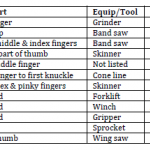poultry plants
At Reveal, Amy Julia Harris and Shoshana Walter investigate an increasing criminal justice trend in which defendants are sent to rehab, instead of prison. On its face, the idea is a good one, especially for people struggling with addiction. However, the reporters find that many so-called rehab centers are little more than labor camps funneling unpaid workers into private industry.
The story focused on one particular center, Christian Alcoholics & Addicts in Recovery (CAAIR) in Oklahoma. Started by chicken company executives, CAAIR’s court-ordered residents work full-time at Simmons Foods…
Drivers honked and waved. They gave thumbs up to the 30 people on the sidewalk. The group was holding signs outside a North Carolina poultry plant. “El baño” – the bathroom – was the word catching the drivers’ attention.
The scene on August 14 was a demonstration in front of the Case Farms poultry plant in Morganton, NC. The company supplies chicken to KFC, Popeyes, and Taco Bell.
Alisa Olvera outside of Case Farms poultry plant in Morganton, NC.
The reason for the peaceful protest?
The Case Farms plant has a sanitation problem. Workers don’t have access to the bathroom when they need to…
Rep. Doug Collins (R-GA) says U.S. poultry companies “are being handcuffed” by a rule that set the maximum processing line speed at 140 birds per minute. Collins wrote this week to USDA Secretary Sonny Perdue and asked him to consider raising the maximum speed to at least 175 birds per minute. He says it's a step toward
“removing red tape and needless regulatory obstacles holding back our economy.”
Allowing poultry processing plants to increase line speeds above 140 birds per minute was a bad idea when the Obama administration's USDA proposed it, and it’s still a bad idea.
Workers in poultry…
At ProPublica, Michael Grabell investigates how U.S. companies take advantage of immigrant workers, focusing on Case Farms poultry plants, which former OSHA chief David Michaels once described as “an outrageously dangerous place to work.” He reports that Case Farms built its business by recruiting some of the world’s most vulnerable immigrants, who often end up working in the kind of dangerous and abusive conditions that few Americans would put up with.
Grabell chronicles the history of Case Farms and how it first began recruiting refugees from Guatemala who were fleeing a brutal civil war in…
Yesterday was a notable one in the efforts to improve working conditions for U.S. poultry processing workers. At a Perdue chicken processing plant in Salisbury, Maryland, faith leaders and worker advocates delivered some special packages to company officials. Thirteen hundred miles way in Springdale, Arkansas, the U.S. largest poultry company announced new initiatives to improve conditions for its poultry processing workforce. I tip my hat to the diverse coalition of worker advocates who set the stage for these event. More on their contribution below, but first the story from Salisbury,…
I can thank the Trump Administration for one thing. I now have a new phrase to describe how the poultry industry distorts information about working conditions for its employees: alternative facts.
Last fall, the National Chicken Council, National Turkey Federation and U.S. Poultry & Egg Association made a wild pronouncement about their industry’s work-related injury rate. They asserted their injury rates are at an all-time low and have declined by 81% since 1994. The trade associations' news release said:
“Perhaps more than any other industry, the poultry industry has focused its energies…
Poultry processing workers and food safety inspectors are being doused with chemicals in the name of food safety. A slew of antimicrobial agents are approved by the USDA to be used on meat and poultry. The chemicals are considered edible for consumers, but no assessments are made by USDA (or other agencies) on the health risks to workers.
The problem now has the attention of some Members of Congress. Representatives Rosa DeLauro (D-CT), Louise Slaughter (D-NY) and others sent a letter last week to USDA Secretary Vilsack, HHS Secretary Burwell, and Labor Secretary Perez. They expressed "deep…
The Butterball turkey plant in Huntsville, Arkansas ramps up production beginning in October to meet the demand for fresh (not frozen) Thanksgiving turkeys. The working conditions are already dismal. The bad situation is magnified during this peak season as workers on the production line try to keep up with turkey carcasses moving passed at 51 per minute.
Just in time for this week’s holiday, Gabriel Thompson reports on the experiences of Butterball workers in an article appearing today in Slate. One worker, a former prison guard from Puerto Rico named Lisandro Vega spoke to Thompson.…
In “The Invisible Workforce: Death, discrimination and despair in N.J.'s temp industry,” NJ Advance Media reporter Kelly Heyboer investigated conditions facing temp workers in New Jersey, which now has one of the largest concentrations of temp workers in the nation. She reports that growing demand for temp workers has led to the proliferation of “temp towns” — places with dozens of temp agencies and neighborhoods full of temp workers, many of whom report low pay, wage theft, racial and sexual discrimination, and unsafe workplaces.
Heyboer writes:
The temp agencies in New Brunswick are easy to…
At KCRW (an NPR member station), Karen Foshay reports on occupational injuries among low-wage restaurant workers in California and the retaliatory barriers that often keep them from speaking up. She cited a 2011 Restaurant Opportunities Center survey of Los Angeles restaurant workers that found 42 percent experienced cuts, 43 percent experienced burns and more than half reported working while sick. Foshay writes:
At a recent meeting in Azusa (in eastern Los Angeles County), several workers showed off their appointment cards for clinics like Santa Adelina. Three men lifted their pant legs to…
The Equal Employment Opportunity Commission (EEOC) brought a lawsuit last week in U.S. district court against a Georgia-based poultry company for discriminating against an employee with a work-related injury. The firm, Wayne Farms, is one I’ve written about previously (e.g., here, here, here.) They’re a company identified by OSHA for not only serious safety problems, but for injury care that was seriously “out-of-date and contrary to good medical practice.” In one example, a worker with a repetitive motion injury had been seen at least 94 times at a plant's nurses…
A few of the recent pieces I've liked:
Alicia Menendez at Fusion: Pregnant in the time of Zika: How Congress failed women like me
Vann R. Newkirk II in The Atlantic: Can free markets keep people healthy?
Brittney Martin in the Dallas Morning News: Texas' rate of pregnancy-related deaths nearly doubles
Sara Kliff and Ezra Klein at Vox: Public option? Status quo? Collapse? What comes next for Obamacare
Peggy Lowe at NPR/ Harvest Media: Working "The Chain," Slaughterhouse Workers Face Lifelong Injuries
David Dobbs in National Geographic: Why There's New Hope About Ending Blindness
At NPR, John Burnett reports on the conditions facing farmworkers in south Texas 50 years after a landmark strike in which farmworkers walked 400 miles to the capital city of Austin to demand fair working conditions. He writes:
A lot has changed since 1966, when watermelon workers in the South Texas borderlands walked out of the melon fields in a historic strike to protest poor wages and appalling working conditions.
They marched 400 miles to the state capital of Austin; California labor activist and union leader Cesar Chavez joined them.
The farmworkers succeeded in publicizing their cause…
It sounds like malpractice to me. That’s what I’ve been thinking ever since learning how poultry workers are treated (and not treated) for work-related injuries.
The latest example comes from Pilgrim’s Pride, the largest US poultry processing company. Last week OSHA issued the first-ever citation in the industry for inappropriate medical care of repetitive motion injuries. The citation indicated:
“The employer failed to make timely appropriate medical referrals for employees with injuries related to chronic and acute exposures and incidents, heavy lifting and persistent and continuous pain in…
The food safety group Food & Water Watch (FWW) is publicizing data listing the companies and brands of chicken and turkey that have adopted the USDA's controversial "modernized" inspection system. The New Poultry Inspection System (NPIS) shifts responsibility for inspections from USDA specialists to company employees. The change was strongly opposed by food safety groups, but the Obama Administration implemented it anyway in early 2015. (Worker safety advocates also opposed the rule because it proposed a significant increase in line speeds which would lead to more repetitive…
It wasn’t too long ago that OSHA issued a citation to Allen Harim Foods, a poultry producer in Delaware, for failing to give their workers access to the bathroom.
“Employees were not granted permission to use them [toilets] and/or were not replaced at their lines, waiting up to 40 minutes to use lavatories.”
Today, Oxfam America issued a report which suggests that “holding it” is a situation faced by workers throughout the poultry industry. It’s not just a problem for workers at lesser known companies like, Allen Harim. Workers employed by Tyson Foods, Pilgrim’s Pride, Perdue, Sanderson…
This week’s announcement by Allen Harim Foods offers another upsetting example of a poultry company that cares more about its chickens than its employees. The Delaware-based company broadcasted that it
“…is one of the first companies in the nation that has moved to a 100 percent vegetarian feed for its chickens.”
The firm says the move responds to
“…what our customers are telling us” about wanting to buy healthy chicken products.
I can’t help but wonder how their customers would respond if Allen Harim posed this question to consumers:
“Should the employees who skin, debone and package our…
Consumers beware! A survey of 500 poultry-processing workers in Arkansas found that 62 percent said they have gone to work when they were sick. Why? Only 9 percent of the workers reported they had access to earned sick leave.
Have the flu? No problem. Come to work anyway and cut those chicken tenders.
Suffering from diarrhea? No worries. Come to work anyway and skin those chicken breasts.
The survey results, based on a representative sample of poultry workers in Arkansas, come from a report released today by the Northwest Arkansas Workers' Justice Center (NAWJC). The study, "Wage and Working…
Whole digits, tips of fingers, and parts of a thumb. These are body parts of Tyson Foods' employees which were severed last year in 10 of the company's plants. The details are made possible by a new OSHA regulation that took effect on January 1, 2015. The regulation requires employers to report within 24 hours any work-related incident that results in an amputation or hospitalization.
After nearly a year on the books, I was curious to find out what just a single large employer had reported to federal OSHA. I picked Tyson Foods. It has more than more than 400 facilities in 30 US states and it…
The anti-poverty group Oxfam America wants consumers to help poultry workers. Oxfam is calling on consumers to use their purchasing power to demand better working conditions for the 250,000 individuals who work in US poultry processing plants. The target of their demands? The four firms that control about 60 percent of the poultry market: Tyson, Pilgrim’s, Perdue, and Sanderson Farms.
“Consumers do have power,” explains Minor Sinclair, Director of Oxfam America’s US Program. Consumers have “…pushed through changes in antibiotic policies within the poultry industry. They’ve pushed through…


